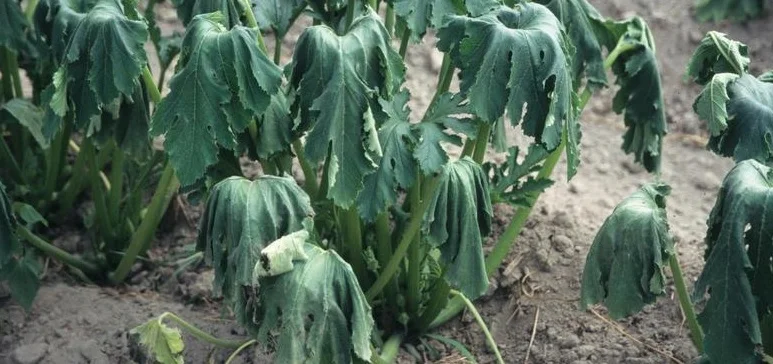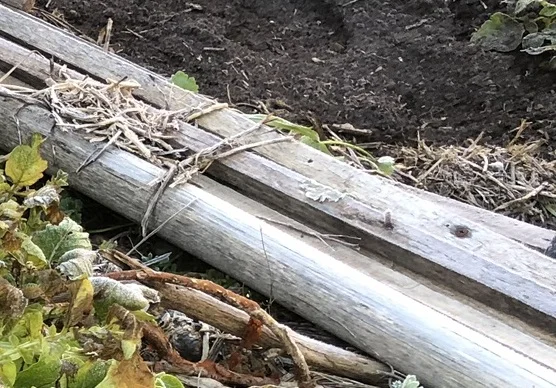ScorchWatch I: Veggies
Following my post ScorchWatch Intro: Degrees, I'm going to do a series of posts on extreme heat tolerance, documenting successes and failures in my own garden and surrounding area.
I'll kick things off with this post on the veggie patch and herb garden.
I live in the Adelaide Hills and the average maximum temperature at my place is about 26°C across summer. However heatwaves can get up into the high 30s and low 40s, and in any case my veggie patch is in a backyard in full sun, surrounded by standard 1.8m Colorbond fencing that acts as a heat trap, meaning real temperatures in the sun can be extreme. The herb garden is a bit better (no direct sun after 2pm) but it's next to paving on two sides.
Below is a rundown of my veggie and herb performance in extreme heat blasts.
Ouch! Tomatoes love warmth but not extreme heat.
| Tomatoes ★★½
Mixed. Some varieties fare better than others. Most love it warm but not hot. The more it's over 32°C the fewer flowers & fruit they produce, and the more help they need (eg sulphur spray for russet mite). Benefits a LOT from 50% shade cloth. |
| Potato ★★½
Similar to tomatoes, eggplants and other fellow members of the Solanaceae family - they love the warm weather but not over 32°C. Overall, best to avoid summer altogether and plant in late winter with the aim of harvesting in January, when the stress of extreme weather will be when the plants are due to die down anyway. |
| Capsicum ★★★★½
Superb. Absolute trooper in extreme heat, even in full sun, so long as it has moderate water. Keeps flowering too. |
| Chilli ★★★★½
Same as capsicum, maybe even tougher again. Depends on the variety - ironically the mild chillies are more heat-tolerant than the hot ones! |
| Pumpkin ★★★★
Reliable plants in hot summers so long as they get moderate water. In 35+°C their defence mechanism is to let their leaves droop, to reduce the surface area exposed to sun and wind. In most cases this doesn't lead to damage, but giving them a regular drink and leaving the roots alone will go a long way. One tip is to avoid growing them near reflective surfaces like sheet metal fences, sheds and pavers - I have invariably had leaves cooked in these situations. |
| Eggplant ★★½
Similar to tomatoes and potatoes, they love warm and consistent weather but not over 32°C. Extreme heat will fry the lower leaves. |
| Lettuce ★★½
Quite dicey. Depends a lot on the variety. Many forums and blogs seem to back this up. Overall, scorchers will make them bolt, go bitter or do both. Not really a summer veggie in southern Australia to be honest. The seed packets are wrong on this I reckon. There are some notable exceptions - I've found the curly-leaf varieties do well in the 'understorey' below bigger plants like tomatoes, where they get some shade protection. |
| Cucumber ★★½
Not bad depending on the conditions. Will survive 40+°C if in a morning sun position or covered by shade cloth. Full sun will singe the leaves and the plant may struggle to bounce back. |
| Beans (climbing & bush) ★★
No good in extreme heat with sun, but great performers if kept under shade cloth. |
| Broad Beans ★★★½
Classic cool-season veggie that can take up to -7°C at least. But what many don't know is that they can take the heat as well. I've had stray seeds pop up in September and go right through the summer. Yes, full sun in Jan-Feb is not their idea of heaven, but they hold their own as a companion in mixed summmer beds, still producing quite prolifically. |
| Chives ★★★★★
Rock-solid and indestructable in all positions, as well as being quite drought-tolerant. The veggie/herb of choice when all of the other Allium species (onion, leeks, shallots etc) are done. |
| Brassicas ★★½
Not entirely fair to assess these as they are not summer veggies, but worth consideration so we know how to stretch them as deep as possible into the hot months. Basically most of them will struggle, but the ones I've found to be toughest are Tuscan Kale and the green Italian-style sprouting broccolis. Tuscan Kale hangs on a long time before bolting, and the sprouting broccolis do try & flower a lot but you can literally 'nip these in the bud' by constantly picking them! They are delicious. |
| Rockmelon ★★★★
A genuine surprise packet. I'd expected these subtropical plants to hate the dry extreme heat, but if well-established & watered they will cope with just about anything, even in full sun. Have had delicious fruits even after the hottest summers. As with most subtropical plants the cold is the real enemy (subject for another time!) |
| Watermelon ★
No good. Loves warm & humid weather but not super hot. Leaves will singe and shrink, and often the vines get burnt off against hot soil or mulch. |
| Sweet Potato ★★★★
Really good. Criminally underrated in SA. Leaves show no damage after heatwaves, and no drop-off in performance. Heat is this plant's speciality. |
| Strawberry ★
Not cut out for extreme heat at all, even in part shade. Lots of foliage burn, and plants take a while to bounce back (if they even do at all). Alpine strawberries are the most sensitive of all. |
| Raspberry ★★½
One of the tougher berry plants for sure, but will get fried leaves in 35+°C. Shade cloth recommended. |
| Blueberry ★
Not cut out at all. See Strawberry. I've tried the ones with so-called greater heat tolerance (eg rabbiteyes) and they're just tolerant to a bit more humid heat (bred in southern US). Shade cloth a must. |
| Carrot ★★★
Solid but not spectacular. Would prefer below 32°C. |
| Celery ★★★★
Surprisingly great. I've read so much about how fussy celery can be, in both cold and heat. I've had no problems at all, germinating mine in winter, growing them through spring and harvesting in summer, with the last plants still going in April. Will inevitably suffer some heat damage but mainly to lower leaves and outer stems. The core will remain strong if you keep the water up. |
| Spinach ★
Great veggie but definitely cool weather only. |
| Silverbeet / Chard ★★★★
Much better option if you want spinach-type produce through the hot months. Pity the foodies don't rate it much in the kitchen. Much like broad beans, silverbeet is a winter crop that punches above its weight in its off-season. It really holds back on going to seed, and is reasonably drought-tolerant due to its deep tap root. At worst some of the bottom leaves will die off. |




